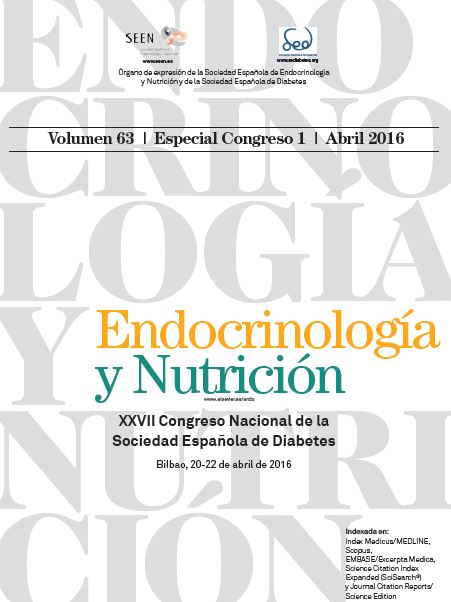P-218. - UNDERSTANDING THE EFFECTS OF THYROXINE SUPPLEMENTATION TO EXPLORE NOVEL VENUES FOR THE TREATMENT OF TYPE 2 DIABETES MELLITUS
CABIMER, Sevilla.
Introduction and objectives: Thyroid hormone (T4) supplementation is known to increase glucose utilization in insulin-target tissues yet patients suffering from hyperthyroidism develop long term metabolic disorders that are, in certain cases, associated with type 2 diabetes mellitus (T2DM). Herein we sought to understand the underlying mechanism of this dichotomy with the goal to target thyroid hormone signalling pathways beneficial for the treatment of T2DM.
Material and methods: Newborn C57/Bl6 mice were treated with T4 until the age of 32 weeks. Body weight was monitored monthly and physical performance was evaluated by rotarod test. Percentage of glycated haemoglobin (HbA1c), oral glucose tolerance test (OGTT), insulin tolerance test (ITT) and glucose quantifications during a 24 hours fasting test were determined to assess metabolic homeostasis. Prior to sacrifice at 32 weeks of age, mice were either injected with insulin (1.5 IU.Kg-1) or saline solution. Protein extracts were then prepared from skeletal muscles and total protein levels for AKT, GSK3β and FOXO1 as well as AKT phosphorylation, implicated in insulin signaling, were assessed by Western blot analysis.
Results: T4-treated mice exhibited a 12-34% lower body weight during the course of the study and displayed improved physical performance. Mice exposed to exogenous T4 showed lower circulating glucose in OGTT (30%), and ITT (37%) as compared to untreated animals, suggesting enhanced glucose clearance. Consistent with the latter, the percentage of HbA1c was reduced in T4-treated mice. Total AKT, GSK3β and FOXO1 protein levels were higher in skeletal muscles of T4-treated mice as compared to untreated mice under basal conditions (e.g. non-insulin treated). Interestingly, increased AKT phosphorylation (Serine 473) was also detected in non-insulin treated T4-supplemented mice. Insulin injection induced maximal AKT phosphorylation in both control and T4-treated mice.
Conclusions: Our data suggest that T4 supplementation enhances skeletal muscle glucose uptake under basal conditions through increased AKT phosphorylation, resulting in improved metabolic homeostasis and physical performance, while reducing body weight gain. We propose that, although hyperthyroidism is a serious disease that prevents the use of T4 in the clinic, interventions based on the modulation of T4-targets may be a promising strategy for the development of novel therapies for the treatment of T2DM.





